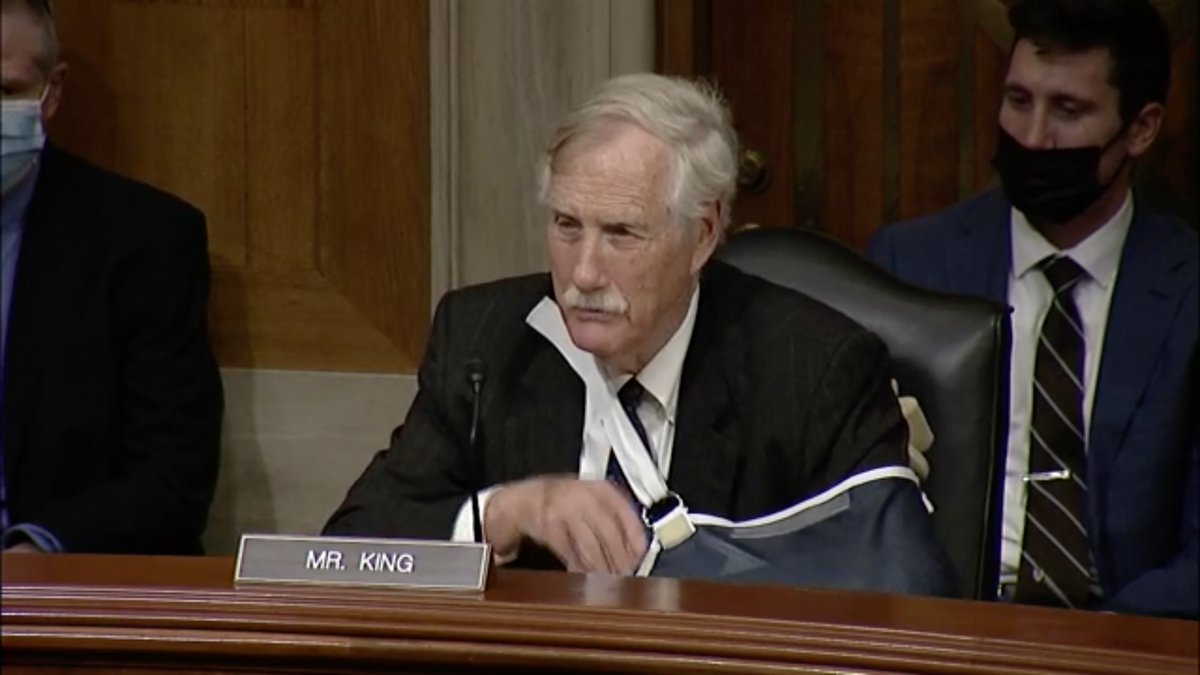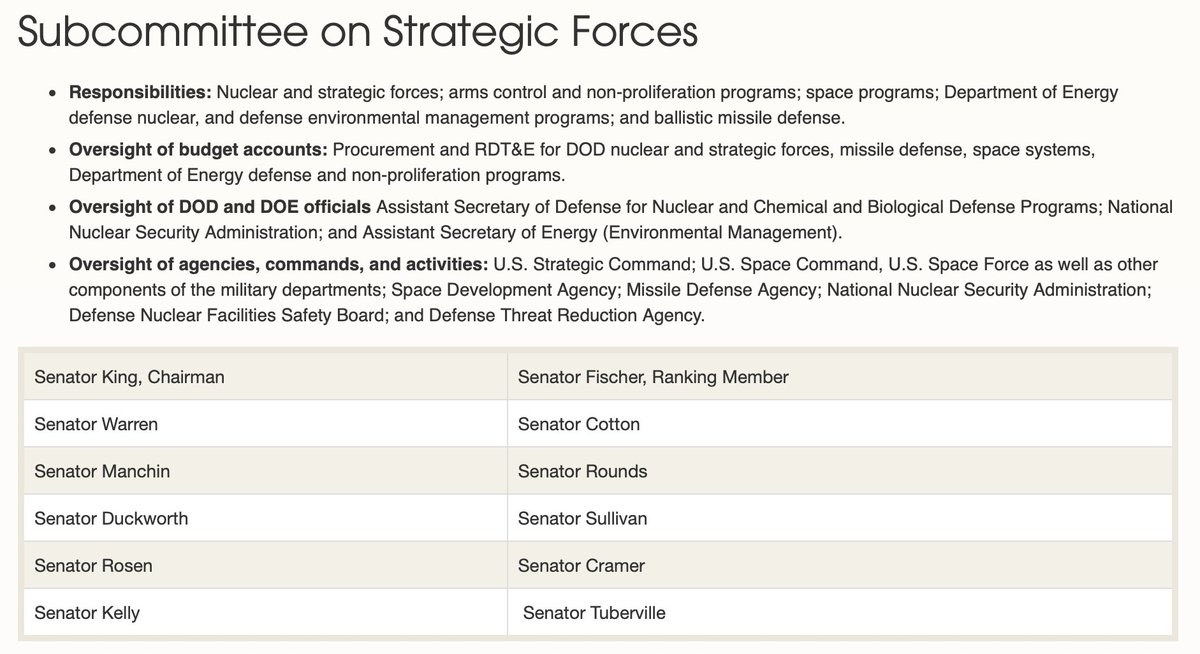LIVE: Senate Armed Services Committee& #39;s Strategic Forces Subcommittee hearing on "US nuclear deterrence policy and strategy," with Livermore& #39;s Brad Roberts, Yale& #39;s Paul Bracken, fmr STRATCOM commander Gen. Robert Kehler, and fmr DOD official Frank Miller. https://www.armed-services.senate.gov/hearings/united-states-nuclear-deterrence-policy-and-strategy">https://www.armed-services.senate.gov/hearings/...
@SenAngusKing opens the hearing saying it is a vitally important subject and that in preparation the subcommittee has received two classified briefings on the nuclear programs of other countries, briefings he labeled "sobering."
Witness Frank Miller says the primary purpose of US nuclear weapons is "to deter Russian and Chinese adventurism." He asserts Russia seeks to offensively intimidate European states and the United States. China& #39;s plans are more opaque but also offensive in nature, he claims.
Miller says that if the Minuteman III is not replaced by the Ground-Based Strategic Deterrent, "we will lose the Triad within a decade." And he excoriates efforts to pursue a nuclear No-First-Use policy as "narcissistic and self-indulgent."
General Kehler: "Nuclear weapons continue to pose the gravest threat." The United States could be destroyed in the time it takes to conduct this hearing. Further reducing the role and number of US nuclear weapons will not persuade adversaries to do likewise. Defends the Triad.
"We have been relying on a dyad" since bombers were removed from daily alert in 1992, although the Triad still exists. Retiring all our ICBMs "would present unprecedented and unacceptable risks." Any change to the nuclear chain of command puts deterrence at risk.
Paul Bracken: I can& #39;t imagine total nuclear disarmament. We& #39;ll be dealing with nuclear weapons for at least another 50 years [Note: Hiroshima and Nagasaki were destroyed 76 years ago this August]. The risk of accidental nuclear war is very low.
Bracken: "Let& #39;s not forget that China is the only country in the world surrounded by five nuclear weapon states." That creates issues for them that we should bear in mind.
Brad Roberts: Tears into @SecDef19 and @TomCollina& #39;s recent recommendations in their book "The Button." Minimum deterrence would increase, not decrease risk. A regional war sliding into nuclear war is a bigger danger than an accidental nuclear war. Modernization is not excessive.
@SenAngusKing notes that he just realized that 50 years ago, he was writing his senior thesis on nuclear deterrence, and that he would be very interested to see what he said on the subject back then.
@SenAngusKing asks how nuclear deterrence can prevent non-state actors from acquiring nuclear weapons—or using them.
Ranking member @SenatorFischer asks the panel about a recent Institute for Defense Analyses assessment of No First Use ( https://www.ida.org/-/media/feature/publications/n/no/no-first-use-of-nuclear-weapons-a-policy-assessment/p-20513.ashx).">https://www.ida.org/-/media/f... Miller and Kehler condemn No First Use. Bracken believes it should be carefully studied and notes US has a de facto NFU policy today.
SASC chair @SenJackReed is, unusually, in attendance. He expresses interest in vigorous US arms control efforts and laments these are MIA. Asks panel for comment. Bracken makes the salient point that by rejecting NFU out of hand, the US tells the world nuclear weapons are useful.
Time for Senator @TTuberville. Says he& #39;s proud Alabama is the headquarters for US missile defense. Complains the United States does not have a hypersonic missile. [Note: we do, he—like too many others in Congress—just doesn& #39;t understand what hypersonic means.]
Tuberville also polls the panel on whether the United States to eliminate its ICBMs (no one says it should). Next, he asks whether nuclear-powered missiles are coming soon or a good idea (good lord, who& #39;s staffing him for this hearing?).
@SenJackyRosen asks about the possibility of resuming explosive nuclear testing in Nevada. Roberts says it might be necessary one day.
@SenAngusKing says his constituents ask whether it& #39;s wise to continue to invest the president with the sole authority to order the use of nuclear weapons. He wants the panel& #39;s views. Bracken thinks its necessary on a practical level but says presidents aren& #39;t automatons.
Miller says "the current system works" and that requiring anyone else to concur with a presidential nuclear authorization risks inviting adversaries to disrupt the time-sensitive conference process to make that decision. "It& #39;s not the best system in the world, but it works."
@SenatorFischer asks whether US nuclear weapons are on "hair-trigger alert," a frequent talking point for members who believe there is no danger in our longstanding alert posture. General Kehler obliges her by explaining how people are in control of each step of the process.
Bracken says the best way to prevent nuclear war is to fully modernize the US nuclear arsenal. He does not mention this will cost at least $1,200,000,000,000.
@SenAngusKing closes the hearing by saying Bracken& #39;s last comment "is a very profound thing." He then reiterates his concern about terrorists obtaining and using nuclear weapons and assigns "homework" to the panelists to get back to him on how to prevent that.
Note to @SenAngusKing: replacing every warhead and delivery system in the US nuclear arsenal with upgraded capabilities will _not_ dissude, deter, or defeat terrorists. It will however, as Bracken noted earlier, send the counterproductive message that nuclear weapons are useful.

 Read on Twitter
Read on Twitter



